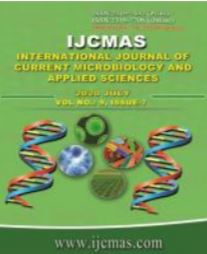


 National Academy of Agricultural Sciences (NAAS)
National Academy of Agricultural Sciences (NAAS)

|
PRINT ISSN : 2319-7692
Online ISSN : 2319-7706 Issues : 12 per year Publisher : Excellent Publishers Email : editorijcmas@gmail.com / submit@ijcmas.com Editor-in-chief: Dr.M.Prakash Index Copernicus ICV 2018: 95.39 NAAS RATING 2020: 5.38 |
The world is facing severe and unpredictable challenges due to increasing abiotic stresses as a consequence of the earth's changing climatic conditions. The increasing waterlogging and salinity stress problems are the example of such disturbances caused in nature. In the present study, the effect of waterlogging, salinity and combined waterlogging & salinity stress on morphological, physiological and biochemical parameters along with protein profile of Pongamia pinnata at seedling stage under nursery conditions have been discussed. Pot culture experiments were conducted in factorial RBD design to observe the effect of waterlogging (W), salinity (S) and combined salinity & waterlogging (SW) stress on the selected seedling under nursery conditions for one year. Waterlogging stress condition was created by perforating the polybag at specific height with standard size and watered daily. Salinity was maintained at 8 dS/m salt concentration. The amount of water equal to the calculated field capacity was provided to each polybag. Total biomass and leaf area were measured in morphological parameters. Physiological parameters viz. photosynthetic rate and stomatal conductance of the seedlings were measured. Total chlorophyll, proline and protein content were estimated for biochemical analysis. Protein profiling of seedlings was performed by SDS-PAGE method. The outcome of the experiment showed that salinity treatment had major negative impact on biomass which can also observe in leaf area. Under waterlogging treatment, the seedling showed very appreciative avoidance and adapted behavior. The seedlings under salt + waterlogging managed to tolerate the combined stress condition which was opposite to deleterious impact of combined abiotic stresses. Two new bands observed under 8 dS/m S + W shows the involvement of protein in the tolerance behavior of seedlings. The plantations of suitable tree species in such areas will be helpful in sustainable forest management and resilient the forest ecosystem to climate change.
 |
 |
 |
 |
 |